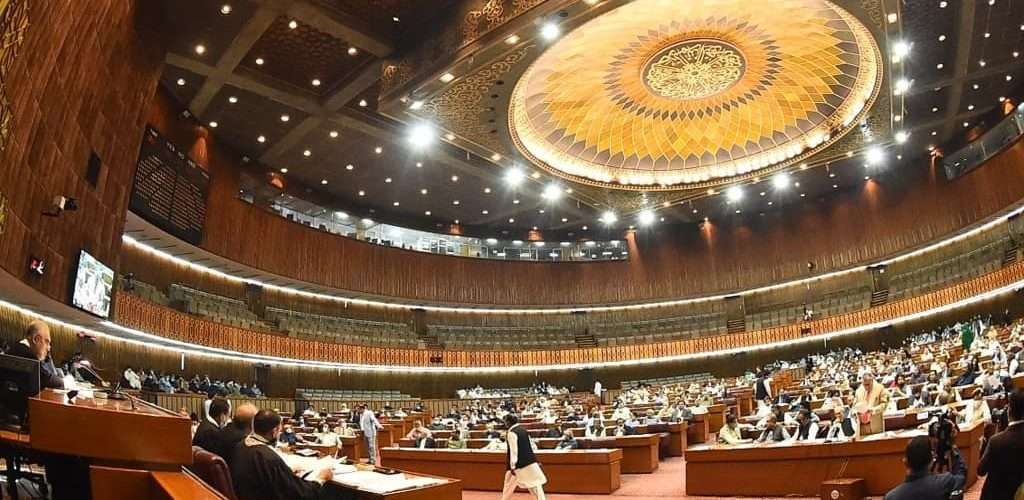- National Assembly Standing Committee on Finance on approves proposed State Bank of Pakistan (SBP) Amendment Bill, 2021

ISLAMABAD: The National Assembly Standing Committee on Finance on Monday approved the proposed State Bank of Pakistan (SBP) Amendment Bill, 2021, with some amendments.
Through one of these amendments the SBP governor will be required to ensure that he/she would not be serving any international financial institution for a period of two years. The governor will also be required to appear before the parliament, according to another proposed amendment.
Finance Minister Shaukat Tarin agreed to amend the clause on the proposed one-time five-year non-extendible tenure for a governor SBP and later told media persons that the matter would be raised with the International Monetary Fund (IMF), however, committee chairman Faiz Ullah later did not include the clause in the final recommendations.
Tarin said the SBP Amendment Bill agreed with the IMF and seen by the Fund Executive Board in March for the release of $500 million had some very strict conditions, but the current bill is totally different from the one agreed upon in March.
The parliamentary panel met here Monday and took up the SBP Amendment Bill 2021. The meeting was also attended by the finance minister, SBP Governor Dr Reza Baqir, the secretary finance and other officials.
Tarin reiterated that the government will still “retain its control” over the central bank even after the passage of the SBP Amendment Act. The SBP will not be a completely autonomous regulator, he added.
The finance minister said the government will nominate eight members to the SBP’s board of directors and approve their appointment.
He said the IMF has asked the government to stop borrowing from the State Bank. Central banks enjoy complete autonomy around the world but the SBP’s role was relegated to a money printing machine’s, which also resulted in increased inflation. The incumbent government has not borrowed from the central bank; however, the earlier loans amounted to Rs 7,000 billion, he added.
Opposition members urged the committee chairman to discuss the bill clause by clause as every member will have suggestions and proposals to make. Tarin said that they can give their suggestions on any clause they want.
Addressing the opposition lawmakers’ concerns, the finance minister said the government would appoint a board of governors of the SBP that will work under the oversight of the Parliament. He said the central bank will not have powers to take decisions unilaterally and will be supervised by a board of governors to be appointed by the government.
All objections to the previous bill granting the SBP autonomy have been addressed, he added. Under the new law, he said, the finance minister and the SBP governor will have a close liaison and deliberate on important decisions regularly.
Briefing the committee, Dr Baqir said that rumours had it that the government had handed the SBP over to the IMF. Now the draft has come before everyone in which all the powers are with the government.
He contended: “It is wrong to give the impression that the IMF is being made the owner of the SBP. I have resigned from the IMF. Yes, I used to work for the IMF. Is it a crime to work in any international organization?” He added that the history of the country shows that many governors worked in the IMF, the World Bank, the Asian Development Bank (ADB), and other international financial institutions.
“I have no other nationality. I am a Pakistani national,” said Governor SBP, adding that he does not have permanent residence in any other country. There was talk of abolishing the Monetary and Fiscal Policy Board, said the governor SBP, adding that the government is consulted on a weekly basis on all matters. The prime minister’s office, the ECC (Economic Coordination Committee) and the Ecnec (Executive Committee of National Economic Council) can always approach the governor SBP whenever they want.
The government will determine the inflation and growth targets, said Tarin, adding that the SBP is currently bringing everything to the Ministry of Finance; however, under the proposed legislation, the SBP will have administrative autonomy.
MNA Nafeesa Shah of Pakistan People’s Party said that the objectives of price stability and growth have been omitted from the preamble of the bill. Further, accountability oversight has been weakened in the proposed bill as the number of reports to the parliament has been decreased, she added.
The governor said that inflation and growth objectives are in the proposed preamble; according to which, it is necessary to enable SBP to achieve domestic price stability by way of regulating the monetary and credit system of Pakistan and without prejudice to the said primary objective, contribute to the stability of the financial system and support the general economic policies of the federal government to foster development and fuller utilisation of productive resources.
The committee was informed that a new section, 4C, specifies the functions of the SBP, which include determining and implementing monetary policy, formulating and implementing exchange rate policy, carrying out and disseminating research relevant to the Bank’s objectives and functions, etc.
The Board of Directors will consist of (a) the governor; (b) secretary finance (without the right to vote; and (c) eight non-executive directors including at least one from each province.
The deputy governors shall have the right to attend the board’s meetings without having the right to vote.
The committee was informed that as per the proposed bill, the monetary and fiscal policies’ coordination boards have been deleted because the language of the existing provision goes beyond commonly used coordination mechanism in central bank’s laws and possesses a risk of undue influence over the SBP’s monetary policy, which have also been objected to by the IMF. Instead a new mechanism for coordination has been proposed between the minister for finance and the governor.
A new section has been inserted; according to which, the governor and finance minister will be required to establish liaison through a mutual agreement with each other.
However, the opposition members objected to the proposed clause, asking how coordination could be possible between the two persons in the absence of a legal body.
The bill also proposed prohibition of the government borrowing from the central bank, while saying that the bank shall not extend any direct credits to or guarantee any obligations of the government, or any government-owned entity or any other public entity.
However, the committee members argued that sometimes in the event of any natural calamity such facility should be allowed.
MNA Ahsan Iqbal raised several objections on the SBP Amendment Bill and stated that there are many clauses which need to be amended.
Iqbal said that dual citizenship clause must envisage or stipulate that the governor SBP cannot have dual citizenship.
He further said that according to the proposed bill, the governor SBP gets a five-year term and then a five-year extension.
The current SBP governor has a three-year tenure. He, however, asked whether he will remain on that post for as many as 13 years.
Iqbal underscored the need for keeping the tenure of governor SBP for a non-extendable period of five years.
He further said that as per the proposed law, the governor SBP and other officials can determine their own salaries. Extend the same ‘privilege’ to the officers of the Finance Ministry as well. “The governor SBP should be bound for two years, so that he cannot join any other institution,” Iqbal added.
He also proposed that the deputy chairman planning should also be included in the board.
Iqbal also objected to the clause that says that the Bank shall be consulted prior to the introduction of any bill by the federal government in the parliament, which may have a bearing on the functions of the bank. He said that the word “prior” should be omitted and as a stakeholder, the bank should be consulted on such legislation.
Tarin said that the previous government kept the dollar-rupee parity artificially at 94, which cost Pakistan $60 billion.
Ahsan Iqbal interrupted, saying “the minister cannot speak in such a manner”.
He asked whether exports have increased by reducing the value of rupee by 40 percent.
MNA Qaiser Sheikh said that if the government borrows from commercial banks then businesses will be affected immensely.
MNA Maulana Abdul Wasi outrightly rejected the bill, saying that other members sitting there have objections but cannot speak their mind due to party affiliations or compulsions. Iqbal said that he would present his objections on the bill in writing.










Add comment